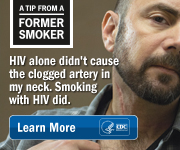HIV and Smoking: A dangerous cocktail

The CDC’s Tips From Former Smokers campaign tells the stories of real people who experienced the challenges and rewards of quitting smoking. One of those stories is about Brian, a former smoker who has HIV. His story shows how smoking cigarettes can intensify the health risks of HIV, even for people who have their condition well controlled.
Brian’s story begins nearly 20 years ago with a hospital stay and an HIV diagnosis. Brian had contracted — with no explanation —a crippling case of pneumonia that left him with no energy and forced him to quit his job.
Once Brian was diagnosed, his health was transformed. He began receiving medications to control his HIV, which allowed him to regain his strength and return to work. Brian knew that HIV would forever be part of his identity, but it alone wouldn’t prevent him from living a long and productive life. The knowledge that he survived HIV and pneumonia, made Brian feel invincible, and two months after leaving the hospital Brian started smoking cigarettes again.
Brian had first started smoking as a teenager. It seemed daring to him—a symbol of freedom and independence. But he quickly learned that cigarettes had nothing to do with freedom. Smoking had become an addiction that controlled him and he wanted to quit.
When Brian picked up cigarettes again, he didn’t understand that mixing HIV with smoking is a perilous combination.
Smoking is dangerous for everyone—it is the leading cause of preventable death in the U.S., killing 480,000 Americans every year. But the risks of serious health consequences are much higher for smokers who are living with HIV. Smoking increases the chances of heart disease, cancer, serious lung diseases and infections, which are all conditions that those with HIV are more vulnerable to developing. Despite this, people who are HIV-positive are more likely to smoke. The smoking rate is two to three times higher among adults with HIV than those without.
Despite many attempts to quit, Brian continued smoking until New Year’s Day in 2013. After taking a cigarette break from this job as a master teacher at a pottery studio, he returned to find that his right hand had stopped working. He couldn’t hold a pen, a glass, or a piece of clay. He struggled to speak. At just 43 years old, Brian was having a stroke.
Fortunately, Brian was rushed to the hospital and surgeons cleaned out a clogged artery in his neck. His doctors told him that HIV, both the virus and some of the treatments, can increase your risk for a stroke and that his continued smoking had substantially increased that risk and caused a stroke. After three decades of being addicted to cigarettes, this was the news that finally led Brian to quit smoking. The day of the stroke was the last time he picked up a cigarette.
Brian went through a long process to regain use of his body and mind, and the effects of the stroke still linger. At first, he couldn't dress himself, brush his teeth, or cook. Speaking and reading were difficult. Today, Brian can manage buttons and shoelaces, as long as he goes slowly, but numbness in his right hand affects his ability to work.
Despite the struggle of relearning basic tasks after the stroke and recovering from a near fatal case of pneumonia that left him sprawled on his apartment floor, Brian still counts quitting smoking as one of the hardest things he has ever done. He also sees it as one of the best things he's ever done for his health and his future.
It took a stroke for Brian to decide that he would stop smoking for good. Now, he hopes his story will inspire others—especially people living with HIV—to quit before they experience a serious health consequence.Read more about Brian’s story, watch his video, and download his tip to post or share with others. Learn more about smoking and living with HIV on this page from HIV.gov.